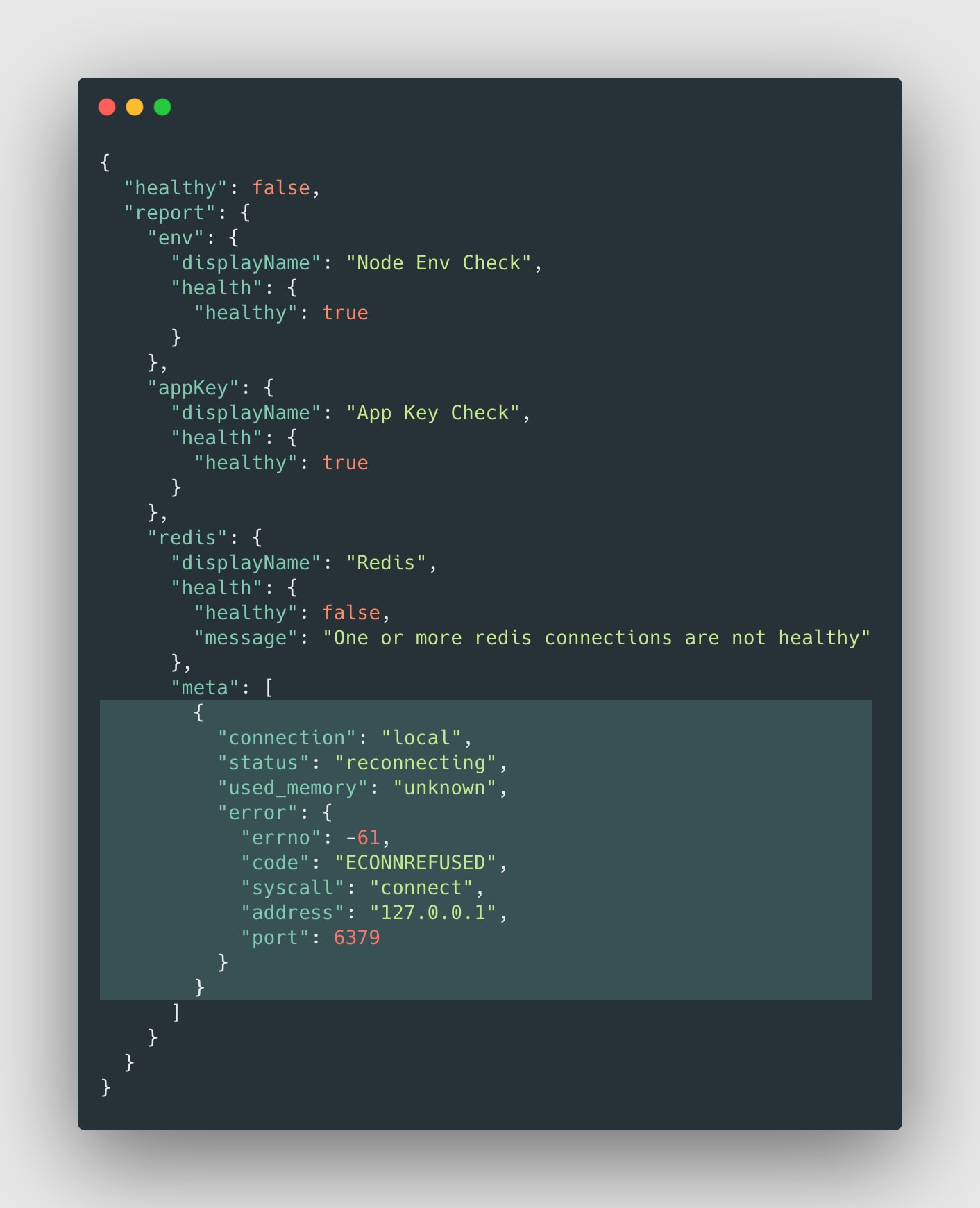Redis
AdonisJS has its own first party package for working with Redis databases. It internally uses ioredis but improves the pub/sub layer and provides first class support for connections management and health checks.
The first step is to install and configure the package using the following instructions.
npm i @adonisjs/redis@7.3.4
node ace configure @adonisjs/redis
# CREATE: config/redis.ts
# CREATE: contracts/redis.ts
# UPDATE: .env
# UPDATE: tsconfig.json { types += "@adonisjs/redis" }
# UPDATE: .adonisrc.json { providers += "@adonisjs/redis" }
/**
* Make sure to add the following validation rules to the
* `env.ts` file to validate the environment variables.
*/
export default Env.rules({
// ...existing rules
REDIS_CONNECTION: Env.schema.enum(['local'] as const),
REDIS_HOST: Env.schema.string({ format: 'host' }),
REDIS_PORT: Env.schema.number(),
REDIS_PASSWORD: Env.schema.string.optional(),
})
- Improved pub/sub support
- Boilerplate free multiple connections management
- Inbuilt health checks
Configuration
The configuration for redis is stored inside config/redis.ts file. You can define one or more named connections inside this file and their lifecycle will be managed automatically for you.
import { redisConfig } from '@adonisjs/redis/build/config'
export default redisConfig({
connection: Env.get('REDIS_CONNECTION'),
connections: {
local: {
host: Env.get('REDIS_HOST'),
port: Env.get('REDIS_PORT'),
password: Env.get('REDIS_PASSWORD', ''),
db: 0,
keyPrefix: '',
},
},
})
connection
Default connection to use for making all redis queries. The connection value is inferred from the REDIS_CONNECTION environment variable.
connections
A list of available connections that you are planning to use in your application. Feel free to add/remove connections from this object.
Usage
Once the setup has been done, you can import the module and execute redis commands. All the methods from ioredis are supported as it is by the AdonisJS redis module.
import Redis from '@ioc:Adonis/Addons/Redis'
await Redis.set('foo', 'bar')
const value = await Redis.get('foo')
You can switch between connections using the Redis.connection method. We create/manage singleton instances for every connection and use it throughout the lifecycle of the application.
import Redis from '@ioc:Adonis/Addons/Redis'
await Redis
.connection('session') // 👈 Switching connection
.set('foo', 'bar')
Pub/Sub
Redis forces you to maintain two separate connections when using pub/sub, where the subscriber uses a dedicated connection just listening for new messages.
In AdonisJS, we have improved the API of pub/sub and manage the subscriber connection internally for you, so that you don't have to create and manage it manually.
For demonstration, lets create a pub/sub channel for tracking user signups. Begin by creating a new preload file by executing the following Ace command.
node ace make:prldfile redis
# ✔ create start/redis.ts
Open the newly created file and paste the following code snippet inside it.
import Redis from '@ioc:Adonis/Addons/Redis'
Redis.subscribe('user:signup', (user: string) => {
console.log(JSON.parse(user))
})
Next, create a dummy route to publish to the user:signup channel on every new HTTP request.
import Route from '@ioc:Adonis/Core/Route'
import Redis from '@ioc:Adonis/Addons/Redis'
Route.get('/signup', async () => {
await Redis.publish('user:signup', JSON.stringify({ id: 1 }))
return 'handled'
})
- The
Redis.subscribemethod listens for messages on a given channel. - The
Redis.publishmethod is used to publish events to a given channel. - The messages are passed as string, since Redis doesn't support other data types during Pub/sub.
Pattern pub/sub
Redis also supports pub/sub using patterns. Instead of subscribe, you have to use the psubscribe method.
Redis.psubscribe('user:*', (event: string, user: string) => {
console.log(event, JSON.stringify(user))
})
Health checks
The Redis module uses the AdonisJS health check module to report the connections health. All you need to do is enable it inside the config file.
{
local: {
host: Env.get('REDIS_HOST', '127.0.0.1') as string,
port: Env.get('REDIS_PORT', '6379') as string,
password: Env.get('REDIS_PASSWORD', '') as string,
db: 0,
keyPrefix: '',
healthCheck: true, // 👈 health check
},
}
Now, you can use the health check module to view the status of your redis connections.
import Route from '@ioc:Adonis/Core/Route'
import HealthCheck from '@ioc:Adonis/Core/HealthCheck'
Route.get('health', async ({ response }) => {
const report = await HealthCheck.getReport()
return report.healthy
? response.ok(report)
: response.badRequest(report)
})

Closing connections
You can close the redis connections using one of the following methods.
quit
The quit method closes the redis connection gracefully. This method will wait for all queued commands to finish.
await Redis.quit()
await Redis.connection('name').quit()
disconnect
The disconnect method doesn't wait for existing commands to finish and will disrupt the connection immediately.
await Redis.disconnect()
await Redis.connection('name').disconnect()
quitAll
Similar to quit, but quits all the connections
await Redis.quitAll()
disconnectAll
Similar to disconnect, but disconnects all the connections.
await Redis.disconnectAll()